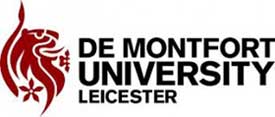About Intelligent Systems And Robotics Msc/pg Dip/pg Cert in De Montfort University
Computational Intelligence (CI) encompasses the techniques and methods used to tackle problems that traditional approaches to computing struggle to solve. The four areas of fuzzy logic, neural networks, CI optimisation and knowledge-based systems encompass much of what is considered to be computational (or artificial) intelligence. There are also opportunities to apply what you learn in areas such as robot control and games development, depending on your interests.
You can choose from a number of specialist modules including natural language processing, artificial neural networks and data mining techniques, while developing your skills in our dedicated robotics laboratory, equipped with a variety of mobile robots. The applied computational intelligence module considers knowledge-based systems, as well as the historical, philosophical and future implications of AI, and focuses on current research and applications in the area.
Modules include work based on research by the Institute of Artificial Intelligence (IAI). With an established international reputation, its work focuses on the use of fuzzy logic, artificial neural networks, evolutionary computing, mobile robotics and biomedical informatics, providing theoretically sound solutions to real-world decision making and prediction problems. Previous students have published papers with their IAI project supervisors and progressed on to PhD study.
Key features
- Our internationally recognised Institute of Artificial Intelligence (IAI) helps to inform the content of our course, allowing you to understand the current research issues related to artificial intelligence and potential areas that need more research focus.
- The modules you’ll study feature work based on research by our IAI and focus on the use of fuzzy logic, artificial neural networks, evolutionary computing, mobile robotics and biomedical informatics, providing theoretically sound solutions to real-world decision-making and prediction problems.
- Your studies can work around your work and other commitments with full-time, part-time or distance learning study options available. This makes the course ideal for both recent graduates and professionals already in employment.
- You will have access to our dedicated Advanced Mobile Robotics and Intelligent Agents Laboratory which contains a variety of mobile robots including the Lynxmotion Hexapod robot, TurtleBots and LEGO MINDSTORMS EV3 kits, providing excellent resources for teaching and research.
- Artificial intelligence is a growing industry across the globe. Employment opportunities exist in areas such as games development, control systems, software engineering, internet businesses, financial services, mobile communications, programming, and software engineering.
Entry criteria
You should have the equivalent of a British Honours degree (2:2 minimum) in a relevant subject.
We are happy to consider equivalent qualifications from anywhere in the world.
If English is not your first language an IELTS score of 6.0 or equivalent when you start the course is essential. English Language tuition, delivered by our British Council accredited Centre for English Language Learning, is available both before and throughout the course if you need it.
De Montfort University Highlights
| Type of Institution |
Public |
| Campus Setting |
Urban |
| Endowment |
£1.17 million |
| Number of Campuses |
4 faculties |
| Number/Percentage of International Students |
23205 |
| Total number of Professors |
3240 |
| Student Satisfaction Rate |
86% |
| Graduate Job Rate |
97.3% |
| Number of Residence Vacancy |
Around 3000 |
| International fee |
Undergraduates- £13240 (annual) Postgraduates- £15950 (annual) |
| Number of Academic Programs |
UG, PG, Part time, distance, blended |
| Mode of Program |
Full time, distance and online |
| Average Graduate Salary |
19800 pounds a year |
De Montfort University The tuition fee (In GBP) for various programs is tabulated below:De Montfort University Average Cost
| Field of Study |
Avg.Fees |
| Art, Design and Humanities: |
£13,750 |
| Business and Law |
£13,750-£14,550 |
| Media |
£13,750 - £14,250 |
| Engineering |
£14,250 |
| Computing |
£14,250 |
| Health and Life Sciences |
£13,250 - £14,250 |
| Nursing BSc |
£14,950 |
De Montfort University The Average Tuition Fees and Other Expenses
| Expenses |
Estimated cost in pounds |
| Undergraduate tuition fee |
13,250- 14950 |
| Postgraduate tuition fee |
13600-15,900 |
| On campus accommodation |
5,000-6040 |
| Average cost of living |
97-110 per week |
DMU International Scholarship up to 1500 pounds
- TEF Gold Outstanding Alumni Scholarship up to 3000 pounds
- Leicester Castle Business School Scholarships:
- Global MBA Scholarship £3,000 - £5,000
- Full Postgraduate Scholarship
- LGBTQ + Allies Scholarship-two fully funded post graduate taught scholarship packages including full fee weaver and maintenance bursary.
- Vice Chancellor's Sports Scholarship- three different scholarship packages are available with eligible students being awarded up to 6000 pounds of support.
